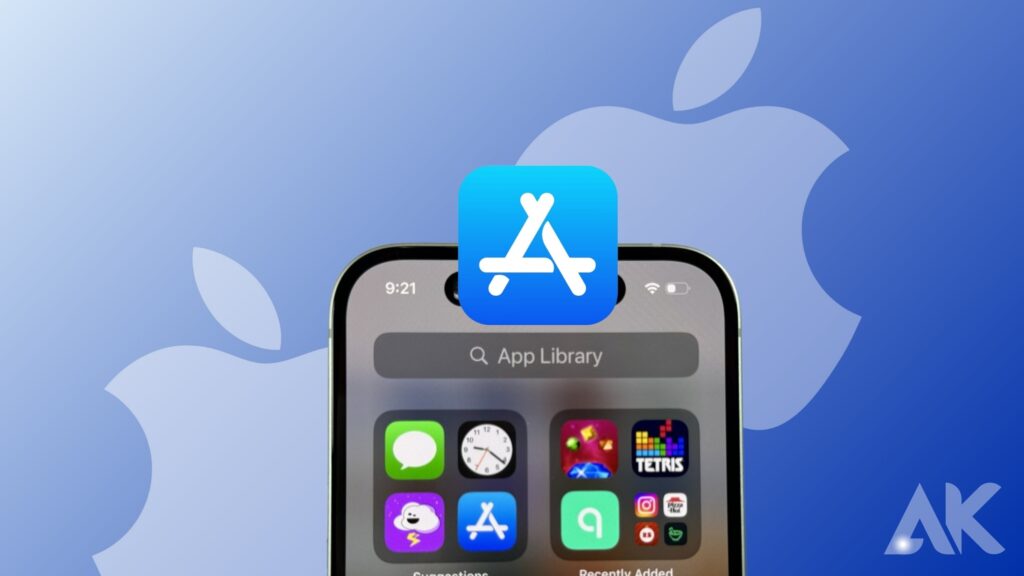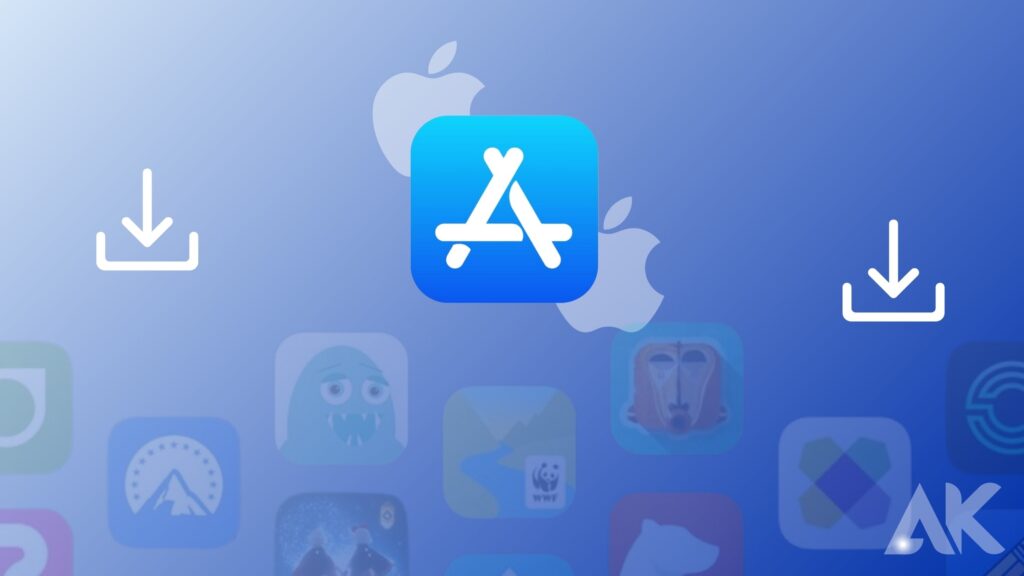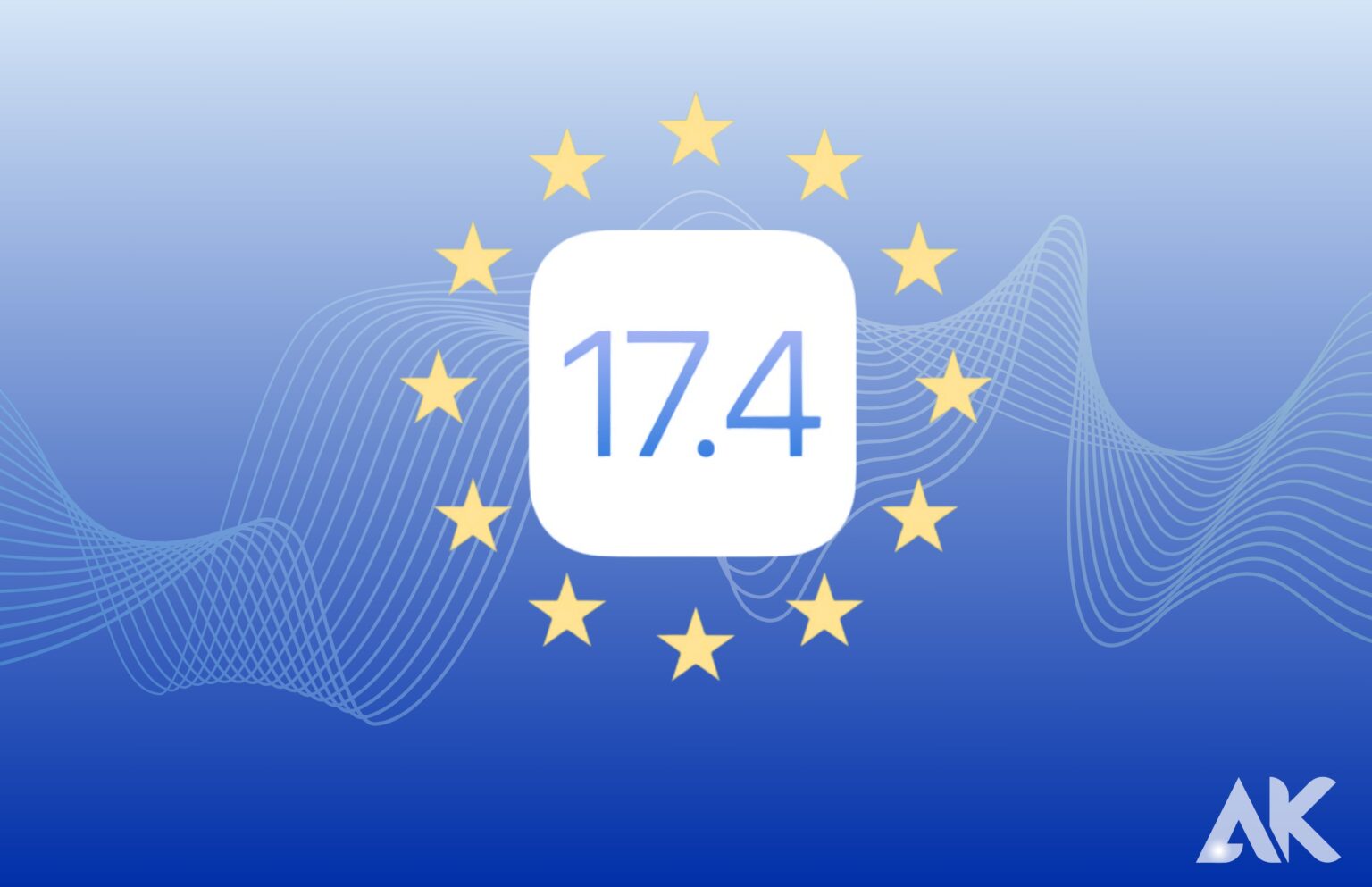With the European Union (EU) keeping a close eye on Apple’s rule compliance, the future of the App Store is precariously poised at the intersection of technological progress and regulatory scrutiny. Issues of equity, competitiveness, and user agency have recently dominated discussions around the App Store, a vital component of the digital ecosystem that serves as both a platform for app developers and a market for users.
Apple updates the App Store and iPhone to comply with EU rules. What changes?

Apple has updated iOS, Safari, and the App Store in response to the Digital Markets Act that the European Union passed.
In preparation for strict new antitrust regulations in the European Union, Apple Inc. is launching a monumental revamp of its iOS, Safari, and App Store products.
The business announced Thursday that, as a result of the update, users would be able to access third-party app stores for the first time. Also, developers and politicians will have their two main complaints addressed: the ease with which users can switch default online browsers and the availability of alternative payment methods.
The latest Digital Markets Act that the European Union passed strengthens the commission’s ability to enforce antitrust laws and imposes strict restrictions on the biggest internet companies. In response, Apple is releasing iOS 17.4 in March with these extensive modifications. Apple, however, is taking legal action by suing the EU courts over the rules.
For Apple and the European Union, this announcement marks a watershed moment. As a guiding concept of the technology, the App Store’s closed architecture prioritized security, user experience, and revenue generation. If the European Union wants to see if it can influence major tech corporations to modify their ways, the biggest test will be Apple’s recent actions.
Following early gains, shares fell as a result of the announcement’s startling effect on investors. The stock price was $193.83, a decrease of less than 1% as of 2:08 p.m. in New York.
On Thursday, Apple officials warned that the changes could undermine the company’s commitment to user security.
Former Apple marketing head and current App Store manager Phil Schiller warned Thursday that the “ingredient in that is a risk” that comes with developing technology that allows apps to install additional apps. For your device’s confidentiality, safety, and functionality, that might be a major entry point for malicious actors. To lessen the impact of this possibility, Apple has instituted new regulations and technology.
Schiller elaborated by saying that there could be “new risks for users” due to the prevalence of malware and other harmful technologies in this election year, especially when it comes to alternative app markets that do not adhere to Apple’s security requirements. The business will not apply its rules on content to a marketplace that is not affiliated with it.
Developers will have access to new capabilities as part of the update, including the ability to use the iPhone’s payment chip in tap-to-pay apps, third-party engine support in browsers, and robust gaming streaming services. They can also ask for more advanced capabilities in the iPhone’s software and hardware.
Apple has levied a charge of up to 30% on developers ever since the App Store debuted in 2008, but this new method does away with that. In the first year, they will pay the corporation 17% of app revenues; after that, for the majority of developers and subscriptions, that number drops to 10%. The commission structure will remain the same outside of the EU, according to the corporation.
The software industry is still facing new expenses. The first of the new costs is a 3% processing fee for programs that use Apple’s in-app purchase mechanism. The second is a €0.50 tax for software that has more than 1 million installs in 12 months, whether through Apple’s store or third-party markets.
The majority of developers in the European Union would either see a decrease or no change in their payments to Apple. Only a small fraction, less than 1%, will be required to pay the app install charge, according to the business. This change also eliminates the need to pay any further commission above €0.50 for apps sold through channels other than the App Store.
As a result of the change, Apple’s service revenue, which has been growing rapidly in recent years, could take a hit. More than 20% of the company’s sales come from that sector presently, compared to less than 10% a decade ago.
When you sideload apps from somewhere other than the App Store, Apple’s in-app purchase system won’t work. The only cost to Apple when developers use that method to distribute their work is €0.50. However, Apple has stated that notarization and security testing of the apps will still be necessary.
New developer tools allow other parties to build app download stores and web browsers apart from WebKit, the standard that Apple has mandated since the App Store’s inception. This is an additional charge.
Only apps hosted on the developer’s website will be able to be installed through third-party app stores. In anticipation of these developments, other software developers have announced plans to open online stores.
The creation of tap-to-pay apps by banks and other financial services will finally be able to compete with Apple Pay on the iPhone. In addition, Apple users have the option to make a third-party app store or payment app their default in their preferences. Another compromise is that when opening Apple Safari on iOS 17.4, users will be asked to select a default online browser.
Bloomberg News reported on Apple’s plans for December 2022.
Adding to the list of long-standing gripes, Apple has finally granted developers like Microsoft and Nvidia the green light to make an app that can stream an infinite amount of games within it. It will be available all over the world.
Another piece of legislation that prohibits platform preference is the Digital Markets Act (DMA). There is a prohibition on companies using customer data they acquire from third-party vendors to undercut them or merge customer data across all of their services.
Concerning a related issue, antitrust authorities in the European Union are considering a massive fine against Apple for the way its App Store policies allegedly prevent competitors from providing cheaper subscription alternatives to music streaming services. The European music streaming behemoth Spotify Technology SA initiated the probe. The maximum fine could be 10% of Apple’s yearly revenue, which is significantly more than the penalties typically imposed in the EU.
The App Store’s alleged antitrust violations have also attracted attention on the other side of the Atlantic. Midway through January, the US Supreme Court decided not to take up the appeals filed by Epic Games Inc., the developer of Fortnite, and Apple in their antitrust lawsuit involving the App Store.
There was no violation of federal antitrust law by Apple’s App Store regulations, according to the trial court. However, she found that the corporation violated California’s antitrust statute by limiting developer discussions.
In response to Apple’s new restrictions, Epic Games CEO Tim Sweeney characterized the proposal as an example of “malicious compliance.”
“They are forcing developers to choose between App Store exclusivity and the store terms, which will be illegal under DMA, or accept a new also-illegal anticompetitive scheme rife with new Junk Fees on downloads and new Apple taxes on payments they don’t process,” Sweeney wrote on X, formerly Twitter.
The developer did, however, promise to reintroduce Fortnite and debut an iPhone app store. “Continue to argue to the courts and regulators that Apple is breaking the law,” the company stated on X, along with the announcement that “Fortnite will return to iOS in Europe in 2024, distributed by the upcoming Epic Games Store for iOS.”
Spotify announced earlier this week that it will offer in-app purchases inside its iPhone software and distribute companion apps to its main service via the web in preparation for the announcement by Apple.
Whether Apple’s actions constitute an effort to comply with or circumvent the new regulations will be the primary concern, according to Margrethe Vestager, the EU’s antitrust director, who stated Thursday.
She told reporters during a briefing that this would serve as their test. “Is this a method to get around the law’s intended purpose?”
Apple to allow EU downloads outside the App Store for extra fees

Developers in the European Union will soon be able to distribute their programs outside of Apple’s App Store, according to Apple’s Thursday announcement.
This change is a direct result of the Digital Markets Act (DMA), a recent piece of legislation passed by the European Union. The DMA mandates, among other things, that apps developed by companies with 75 billion euros ($82 billion) in market capitalization and 45 million monthly active users must be compatible with each other’s apps, and users must be able to choose which apps to have pre-installed on their devices.
Without having to use Apple’s in-app payment system—which takes a cut of up to 30%—developers will have the option to provide alternative app stores for iPhones beginning in March. Developers must still submit their apps to Apple for assessment, which includes checking for cybersecurity concerns and blatant fraud. Additionally, large app developers will still be charged a “core technology fee” by Apple, regardless of whether they use their payment services or not.
“Fortnite” developer Epic Games CEO Tim Sweeney called Apple’s proposed adjustments “hot garbage” and expressed his doubt that they are lawful under the DMA. Epic Games filed an antitrust lawsuit against Apple in the US.
In a string of remarks on the social media platform X, Sweeney stated, “Apple proposes that it can choose which stores are allowed to compete with their App Store.”. “They might stop Epic from releasing ‘Fortnite’ through the Epic Games Store, or they could stop Microsoft, Valve, Good Old Games, or new competitors from offering their products through it.”
Apple provided developers the tools on Thursday to start renegotiating their contracts, and in March, users will be able to view the updated iOS operating system that includes these changes.
Companies like Spotify Technology and Epic have long claimed that Apple’s regulations and fees hurt their bottom lines. However, as a result of legal and regulatory hurdles, Apple’s formerly uniform App Store strategy has evolved into a hodgepodge of regulations in recent years.
As an example, in response to a decision in an antitrust case filed by Epic, Apple announced earlier this month that it will modify its policies on the integration of third-party websites for payment within its applications in the US. However, developers will not reap much financial rewards due to Apple’s 27% commission on link-out revenues and the usual 3% payment processing cost.
On the other hand, developers in the EU will not have to pay anything to incorporate a third-party payment processor into their App Store apps. In addition, European Union iPhone users will be able to choose a default web browser and contactless payment app from Apple, allowing them to bypass the Apple Pay system while making contactless payments.
Developers will still have to pay Apple’s “core technology fee”—50 euros per user account per year—regardless of whether they choose to use the App Store or not.
Apple stated that the price would only be paid by large developers, but it did not provide the exact number of users that would be subject to the levy. In addition to promising not to charge charities, schools, or governments, the business also promised to waive the price for the first million user accounts.
Conclusion
Apple is overhauling its iOS, Safari, and App Store offerings in the European Union to comply with tough new antitrust rules imposed by the EU’s Digital Markets Act. The changes, coming in March as part of Apple’s iOS 17.4 operating system, aim to placate regulators and address concerns of fairness, competition, and user choice. Apple’s changes threaten to undercut the company’s long-held emphasis on user security, as they may undercut the privacy, security, and integrity of devices.
Developers will be able to create tap-to-pay apps using the iPhone’s payment chip, as well as browsers with third-party engines and extensive game streaming services. However, there are new costs for software makers, including a 3% payment processing charge for apps using Apple’s in-app purchase system and a €0.50 fee per app install.
FAQS
Is Apple forced to change chargers in Europe?
Apple is now required by the EU to use the same USB-C charging cable as Android and a plethora of other devices. This charging port connector is mandatory for all phones sold after the autumn of 2024, according to new EU regulations.
Is it OK to change the Apple Store country?
You are only able to access the App Store in nations where you are a legal resident and where a bank has verified your billing address. Apps that are exclusive to a certain country’s app store are no reason to switch countries.

